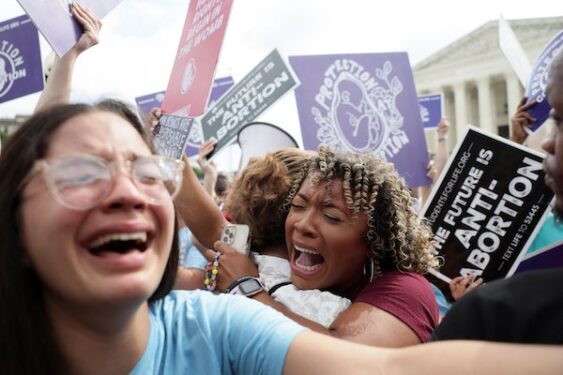
PROSPECT HEIGHTS — Decades of prayers from pro-life advocates were answered this morning as the Supreme Court overturned Roe v. Wade, and in doing so abolished the legal right to an abortion at the federal level, and returned the jurisdiction back to state lawmakers.
The Supreme Court’s decision came in a ruling on the case Dobbs v. Jackson Women’s Health Organization, which dealt with the constitutionality of Mississippi’s 15-week abortion ban. Roe — the landmark 1973 decision that legalized abortion nationwide — held that abortion was legal up to the point of viability (when a baby can survive outside of the womb), which is typically considered to be 24 weeks.
The 6 to 3 majority opinion was written by Justice Samuel Alito. He was joined by Justices Clarence Thomas, Neil Gorsuch, Brett Kavanaugh and Amy Coney Barrett.
Chief Justice John Roberts voted with the majority, but wrote a separate opinion.
“We hold that Roe and [Planned Parenthood v. Casey] must be overruled,” Alito wrote. “The constitution makes no reference to abortion, and no such right is implicitly protected by any constitutional provision.”
Justices Stephen Breyer, Sonia Sotomayor and Elena Kagan wrote the dissenting opinion, stating that regardless of the scope of the state laws that will follow this decision, “one result of today’s decision is certain: the curtailment of women’s rights and their status as free and equal citizens.”
The Dobbs ruling brings to a close months of anticipation from people on both sides of the abortion debate. Pro-life advocates hoped for this decision after a draft opinion of the case leaked on May 3 showing as much.
The U.S. Conference of Catholic Bishop’s Committee on Pro-Life Activities, issued the following statement:
“This is a historic day in the life of our country, one that stirs our thoughts, emotions and prayers,” the statement said. “For nearly fifty years, America has enforced an unjust law that has permitted some to decide whether others can live or die; this policy has resulted in the deaths of tens of millions of preborn children, generations that were denied the right to even be born.”
Meanwhile, pro-abortion advocates feared what the ruling would mean in states that planned to restrict abortion access.
Now that the Dobbs decision has been made, and state lawmakers control abortion laws, there will likely be a flurry of actions from both pro-life and pro-abortion-leaning state governments that will either tighten or loosen abortion access in their state.
Currently, 13 states — Arkansas, Idaho, Kentucky, Louisiana, Mississippi, Missouri, North Dakota, Oklahoma, South Dakota, Tennessee, Texas, Utah, and Wyoming — have “trigger” laws that, with Roe overturned, immediately or almost immediately go into effect and ban abortion.
Five other states — Alabama, Arizona, Michigan, West Virginia, and Wisconsin — have pre-Roe abortion bans still on the books that will also go into effect. However, lawmakers in Wisconsin have signaled there will be a contentious battle over enforcing the law, and a Michigan claims court granted a motion that blocks the state’s attorney general from enforcing the law.
On the other side, 13 states — Colorado, Connecticut Delaware, Hawaii, Illinois, Massachusetts, Nevada, New Jersey, Oregon, Rhode Island, Vermont, Virginia, and Washington — have already codified the right to an abortion into state law at varying stages of pregnancy. For them, the Dobbs ruling has little impact. Four of those states — New Jersey, Oregon, Vermont, and Colorado — have codified the right to an abortion throughout the entire pregnancy.
In New York, per the 2019 Reproductive Health Act, abortion is legal up to 24 weeks of pregnancy, or when “there is an absence of fetal viability, or the abortion is necessary to protect the patient’s life or health.” However, the law does not define “health” or “fetal viability” and stipulates that the determination of these factors must be made by a healthcare practitioner. The state’s Catholic bishops, therefore, argue that abortion is legal through nine months of pregnancy.
Ever since the leaked draft of the Dobbs opinion Gov. Kathy Hochul has taken steps to ensure that abortion access is available in the Empire State to New Yorkers and out-of-staters alike. Earlier this week after signing a flurry of abortion rights legislation, Hochul reiterated her belief that “reproductive rights are human rights.”
“The women of New York will never be subjected to government-mandated pregnancies,” Hochul said in a statement. ”Not here. Not now. Not ever.”

